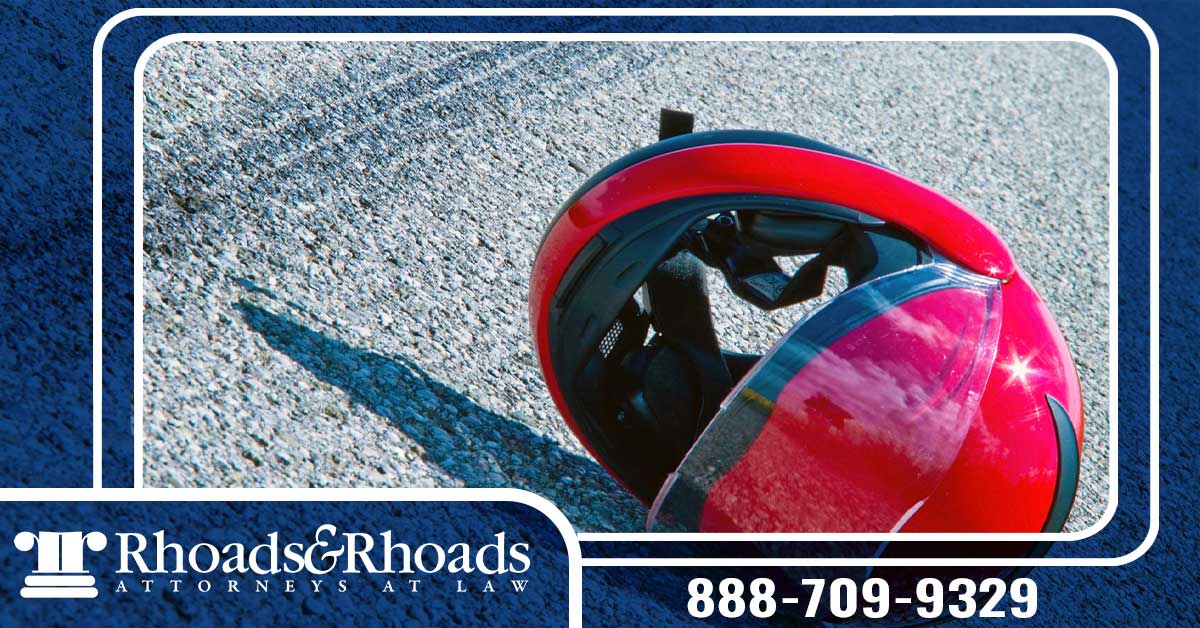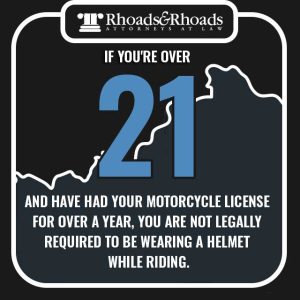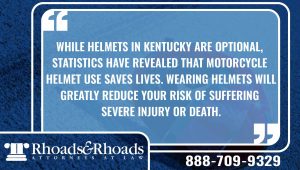
Motorcycles are an enjoyable and exhilarating mode of transportation, but due to negligence of other divers, numerous Kentucky riders suffer from severe and life-threatening injuries every year.
While motorcyclists can experience many different types of serious injuries after a crash, head injuries are notably deadly. A serious head injury can easily be fatal, or it may permanently impair an accident victim. These severe injuries are common for riders who choose to not wear helmets.
 If you’ve suffered from a serious accident and weren’t wearing a helmet, you may wonder whether you can seek or recover damages from the at-fault driver or their insurance company.
If you’ve suffered from a serious accident and weren’t wearing a helmet, you may wonder whether you can seek or recover damages from the at-fault driver or their insurance company.
The answer to this question is yes, but this can be complex, as it will depend on whether you’re considered partially liable for your head injury for not wearing a helmet. Notably, Kentucky law does not require an adult, over 21 years old, motorcyclist to wear a helmet.
Fortunately, we’re here to unpack what you can expect when filing a personal injury claim. You’ll learn about Kentucky motorcycle helmet laws, motorcycle accident statistics, liability for accidents, and recovering compensation after crashing without wearing a helmet.
If you have additional questions regarding motorcycle accident claims, you can speak with a lawyer at Rhoads & Rhoads Attorneys at Law.
We offer FREE case evaluations so that you can learn your legal options after your accident, especially if you choose not to wear a helmet. Call us today at 888-709-9329.
Kentucky Helmet Laws
 There is no universal helmet law in the United States. The state of Kentucky has a mandatory helmet law for drivers and passengers under 21. Additionally, the law applies to wearing helmets if you have had your motorcycle license for under one year.
There is no universal helmet law in the United States. The state of Kentucky has a mandatory helmet law for drivers and passengers under 21. Additionally, the law applies to wearing helmets if you have had your motorcycle license for under one year.
If you’re over 21 and have had your motorcycle license for over a year, you are NOT legally required to be wearing a helmet while riding.
Helmets Can Save Lives: Motorcycle Accident Statistics
 While helmets in Kentucky are optional, statistics have revealed that motorcycle helmet use saves lives. Statistics show that wearing helmets will greatly reduce your risk of suffering severe injury or death.
While helmets in Kentucky are optional, statistics have revealed that motorcycle helmet use saves lives. Statistics show that wearing helmets will greatly reduce your risk of suffering severe injury or death.
The National Highway Traffic Safety Administration (NHTSA) stated that 5,932 motorcycle riders were killed in vehicular accidents in 2021 alone, making up 14% of the total number of fatalities.
The organization also noted that wearing a helmet can reduce your likelihood of suffering fatal injuries by 29%. Motorcycle helmets are especially invaluable for preventing severe head injuries in the event of a crash. It lessens your risk of experiencing a brain injury by 67%.
Reducing your risk of suffering a serious injury in your accident is important because motorcycles don’t provide protection for riders, especially when compared to passenger cars. Due to this lack of protection, motorcyclists are 34 times more likely to die in a crash than other drivers.
Wearing a helmet and wearing additional protective gear, such as leather clothing will decrease your risk of suffering fatal injuries.
Who Is Liable After a Motorcycle Accident?
Before unpacking how not wearing a helmet may impact your motorcycle injury claim, it’s important to understand how determining fault in traffic accidents works.
The person liable for an accident will depend on the actions of the drivers involved leading up to the crash. For instance, if a driver broke traffic laws and failed to yield to another driver, their actions likely caused the collision. They would be liable for all of the victim or injured riders damages not already covered by the victim’s personal injury protection (PIP) insurance.
When Is a Motorist Liable?
Motorists are liable for motorcycle accidents when they drive negligently which causes a wreck or their actions directly cause the crash to occur.
Let’s say that a motorist turning left fails to see a rider who has the right of way. The driver strikes the biker when turning, causing a serious motorcycle accident.
The motorist would likely be liable for the injuries sustained by the biker, as their actions directly caused the motorcyclist’s damages. Depending on their insurance coverage, the driver or their insurance company would be financially responsible for paying for the biker’s medical bills and other damages caused by the accident, including loss of wage/earnings and pain and suffering.
When Is a Motorcycle Rider Liable?
Not everyone injured in motorcycle accidents can recover compensation. Sometimes, motorcyclists are liable for their own injuries.
For instance, suppose a biker runs a red light and T-bones a car. The other driver may not sustain as serious injuries as the biker, but the biker is still liable for the accident. They caused the accident by running the red light, so the other driver would not be liable for the biker’s injuries.
Can I File a Personal Injury Claim If I Wasn’t Wearing a Helmet?
Yes. You can still file a personal injury claim even if you weren’t wearing a helmet during the crash. Although the law does not require you to wear a helmet, the other driver’s insurance company may argue that your injuries were enhanced by not wearing a helmet but this certainly does not mean you don’t have a case. There is, however, a potential that the award in your case could be reduced to some degree.
The reason why is that the other party’s insurer may argue that you’re partially liable for your own head trauma because you weren’t wearing a helmet at the time.
To understand how partial liability may impact your claim, you need to first know the concept of comparative negligence.
What Is Comparative Negligence in Kentucky?
Kentucky is a pure comparative negligence state. Comparative negligence means that you can still recover financial compensation for damages even if you’re considered partially responsible for those damages.
For instance, picture a motorcycle accident in which both parties are partially to blame. Perhaps a motorcyclist was speeding at the time of the crash, but a driver failed to yield the right of way and struck the biker. Both parties’ actions contributed to the accident. The driver may be considered 80% liable while the biker is considered 20% responsible for speeding.
In this scenario, the injured party can still recover compensation, but their damages will be 20% less. Their percentage of blame directly impacts the amount they may recover from the other party.
Comparative Negligence for a Head Injury
Choosing to not wear a helmet could potentially reduce an injured biker’s compensation, as they may be considered partially responsible for the head injuries they sustained.
The other driver’s actions may have caused the accident, but the biker riding without wearing a helmet also contributed to their damages. This is an argument insurance companies make.
Suppose a biker without a helmet suffers brain trauma and neck injuries after being struck by a negligent driver. While the driver involved caused the biker to sustain neck injuries, the biker may be considered partially responsible for their brain injuries due to lack of helmet use. If the biker files a claim with the insurance company or takes legal action against the negligent driver, the insurance company will argue the injuries were “enhanced” by the motorcyclist for failing to wear a helmet – thus trying to reduce your recovery.
The biker’s percentage of blame for their head injuries for forgoing a helmet could negatively impact their settlement. If they’re considered 25% at fault for their brain injuries because they weren’t wearing a helmet, their compensation will be 25% less.
Building Your Personal Injury Claim to Recover Compensation
To recover compensation from the other party involved in your crash, you’ll need to prove that they were negligent and responsible for causing the wreck and that you suffered damages as a direct result, even if you were riding without wearing a helmet.
Strengthening your case with evidence will be important if you weren’t wearing a helmet at the time of your accident, as not wearing a helmet could have some degree of negatively impacting your settlement amount, but there is evidence your attorney can present and arguments to be made to help you.
Receive Medical Attention
Receiving medical attention promptly after your motorcycle accident is critical for both your safety and claim. Those who suffer severe injuries should call 911 and accept emergency medical attention.
Even if your injuries don’t require immediate attention, you should still see a doctor as soon as possible. Getting prompt medical attention will show a causal link between your motorcycle accident and injuries. It is worth noting that delaying treatment may hurt your ability to recover compensation.
Collect Evidence
You and your lawyer need to have evidence showing that the other driver was at-fault for the accident.
Evidence can include:
- Eyewitness statements
- The police accident report
- Photographic and video evidence
- Surveillance footage
- Accident reconstruction expert testimony
You’ll also need to collect evidence proving you experienced damages as a direct result of the motorcycle accident, including:
- Vehicle repair costs
- Medical bills
- Documentation proving lost wages
- Expert medical testimony
Contact a Motorcycle Accident Attorney
Injured bikers who weren’t wearing helmets at the time of their crashes may struggle to recover fair compensation. If you experienced a collision without wearing a helmet, it’s important to contact a motorcycle crash lawyer as soon as possible.
An attorney will help you navigate the complexities of accident law. Your lawyer will also work to ensure you prove the other driver involved was at fault for your accident. An experienced attorney will help you gather valuable evidence, and negotiate a favorable settlement so that you receive the most compensation possible as the injured party.
Here at Rhoads & Rhoads Attorneys at Law, we have years of experience assisting Kentucky motorcycle riders who were riding without helmets with personal injury claims.
You can get a free consultation with our legal team today by calling 888-709-9329, or you can schedule an appointment online here.


